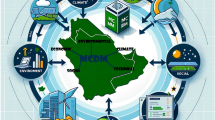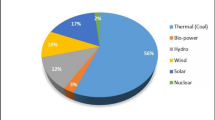Abstract
Currently, increasing urban population creates escalating problems such as housing, infrastructure, transportation, health, environment, safety, and energy consumption. Climate change, emission mitigation, and limited energy supply force urban managers to consider sound measures with the support of technological developments. It is based on data collection and accumulation using IoT, sensors, digital networks, and other means. “Smart urbanism” is a concept that considers predicting, designing, and creating solutions in a systematic, sustainable, and agile manner based on the data collected. Energy is an indispensable dimension in this context. Optimum energy management makes it “smart energy” with the inclusion clean and sustainable renewable energy resources as well as energy efficiency. This study is performed to analyze possible inclusion of geothermal, solar, and wind power. The analyses are based to reveal the best feasible alternative considering the parameters of location, climate, space availability, capital and operational expenditures as well as construction, operation, and maintenance. The Fuzzy Analytic Hierarchy Process (Fussy AHP) technique is used to evaluate the ranking. The proposed method uses fuzzy mathematics for solving problems containing uncertainties as well as less quantifiable. This study proposes a methodological framework for the analysis of competitiveness of alternative renewable energy generations in urban environments. The municipality of Balıkesir is chosen for the case study presented in this work.
Access this chapter
Tax calculation will be finalised at checkout
Purchases are for personal use only
Similar content being viewed by others
References
Khalil, H.B., Zaidi, S.J.: Energy crisis and potential of solar energy in Pakistan. Renew. Sustain. Energy Rev. 1(31), 194–201 (2014)
Mertoglu, O., Simsek, S., Basarir, N., Paksoy, H.: Geothermal energy use, country update for Turkey. In: Proceedings of the European Geothermal Congress, pp. 11–14, Den Haag, The Netherlands (2019)
Kaygusuz, A.: Geothermal energy for clean and sustainable development in Turkey. J. Eng. Res. Appl. Sci. 8(1), 1041–1050 (2019)
Lakatos, L., Hevessy, G., Kovács, J.: Advantages and disadvantages of solar energy and wind-power utilization. World Fut. 67(6), 395–408 (2011)
Brophy, P.: Environmental advantages to the utilization of geothermal energy. Renew. Energy 10(2–3), 367–377 (1997)
Dincer, I., Ozturk, M.: Geothermal Energy Systems, pp. 57–83. Elsevier, Oxford (2021)
Topcu, I., Ülengin, F., Kabak, Ö., Isik, M., Unver, B., Ekici, S.O.: The evaluation of electricity generation resources: the case of Turkey. Energy 167, 417–427 (2019)
Celik, A.N., Özgür, E.: Review of Turkey’s photovoltaic energy status: legal structure, existing installed power and comparative analysis. Renew. Sustain. Energy Rev. 134, 110344 (2020)
Emeksiz, C., Demirci, B.: The determination of offshore wind energy potential of Turkey by using novelty hybrid site selection method. Sustain. Energy Technol. Assess. 36, 100562 (2019)
Argin, M., Yerci, V., Erdogan, N., Kucuksari, S., Cali, U.: Exploring the offshore wind energy potential of Turkey based on multi-criteria site selection. Energy Strat. Rev. 23, 33–46 (2019)
Melikoglu, M.: Geothermal energy in Turkey and around the world: a review of the literature and an analysis based on Turkey’s vision 2023 energy targets. Renew. Sustain. Energy Rev. 76, 485–492 (2017)
Adam, K., Hoolohan, V., Gooding, J., Knowland, T., Bale, C.S., Tomlin, A.S.: Methodologies for city-scale assessment of renewable energy generation potential to inform strategic energy infrastructure investment. Cities 54, 45–56 (2016)
Taminiau, J., Byrne, J.: City‐scale urban sustainability: spatiotemporal mapping of distributed solar power for New York City. Wiley Interdiscipl. Rev. Energy Environ. 9(5), e374 (2020)
Karaca, İ.H., Gürkan, E.C., Yaparh, H.: Konya ve Civarının Güneş Enerjisi Potansiyeli ve Selçuklu Belediyesi Muhtar Evlerinde Güneşten Elektrik Üretim Sistemi Uygulaması. I Konya Kent Sempozyumu, pp. 275–292 (2011)
Güven, A.F.: Bahçelievler Belediye Başkanlık Binasının Enerji İhtiyacının Güneş ve Rüzgar Sistemi ile Karşılanması, Optimizasyonu ve Maliyet Analizi. Sinop Üniversitesi Fen Bilimleri Dergisi. 2(1), 24–36 (2016)
Biberci, M., Doğan, M., Dilber, C., Çelik, M.: Alternatif Yenilenebilir Enerji Kaynaklarının Yerel Yönetimlerde Kullanımı Ve Mali Getirileri, Belediyelerin Geleceği ve Yeni Yaklaşımlar, pp. 541–560 (2017)
Gazheli, A., van den Bergh, J.: Real options analysis of investment in solar vs. wind energy: diversification strategies under uncertain prices and costs. Renew. Sustain. Energy Rev. 82, 2693–2704 (2018)
Arikan, Y., Ertuğrul, Ç.A.: Implementation of feasibility analysis of wind and solar energy on the web base. Int. J. Eng. Res. Dev. 9(1), 1–10 (2017)
Yilan, G., Kadirgan, M.N., Çiftçioğlu, G.A.: Analysis of electricity generation options for sustainable energy decision making: the case of Turkey. Renew. Energy 146, 519–529 (2020)
Li, T, Li, A., Guo, X.: The sustainable development-oriented development and utilization of renewable energy industry——a comprehensive analysis of MCDM methods. Energy 212, 118694 (2020)
Pohekar, S.D., Ramachandran, M. Application of multi-criteria decision making to sustainable energy planning—a review. Renew. Sustain. Energy Rev. 8(4), 365–381 (2004)
Türkseven Dogrusoy, İ., Serin, E.: İzmir kentindeki yenilenebilir enerji kaynaklarının potansiyelinin mimari açıdan irdelenmesi [Analysis of the potencials of renewable energy sources in Izmir city in architectural point of view]. Dokuz Eylül Üniversitesi Mühendislik Fakültesi Mühendislik Bilimleri Dergisi 15(3), 1–25 (2013)
Karatop, B., Taşkan, B., Adar, E., Kubat, C.: Decision analysis related to the renewable energy investments in Turkey based on a fuzzy AHP-EDAS-fuzzy FMEA approach. Comput. Ind. Eng. 151, 106958 (2021)
Wang, Y., Xu, L., Solangi, Y.A.: Strategic renewable energy resources selection for Pakistan: based on SWOT-fuzzy AHP approach. Sustain. Cities Soc. 52, 101861 (2020)
Dursun, B., Alboyaci, B.: An evaluation of wind energy characteristics for four different locations in Balikesir. Energy Sour Part A 33(11), 1086–1103 (2011)
Ilten, N., Selici, A.T.: Investigating the impacts of some meteorological parameters on air pollution in Balikesir. Turkey. Environ Monit. Assess 140(1), 267–277 (2008)
Banos, R., Manzano-Agugliaro, F., Montoya, F.G., Gil, C., Alcayde, A., Gómez, J.: Optimization methods applied to renewable and sustainable energy: a review. Renew. Sustain. Energy Rev. 15(4), 1753–1766 (2011)
Cai, Y.P., Huang, G.H., Yang, Z.F., Lin, Q.G., Tan, Q.: Community-scale renewable energy systems planning under uncertainty—an interval chance-constrained programming approach. Renew. Sustain. Energy Rev. 13(4), 721–735 (2009)
Soroudi, A., Ehsan, M., Zareipour, H.: A practical eco-environmental distribution network planning model including fuel cells and non-renewable distributed energy resources. Renew. Energy 36(1), 179–188 (2011)
Chang, N.B., Parvathinathan, G., Breeden, J.B.: Combining GIS with fuzzy multicriteria decision-making for landfill siting in a fast-growing urban region. J. Environ. Manage. 87(1), 139–153 (2008)
Chou, C.C.: A fuzzy MCDM method for solving marine transshipment container port selection problems. Appl. Math. Comput. 186(1), 435–444 (2007)
Farahani, R.Z., Asgari, N.: Combination of MCDM and covering techniques in a hierarchical model for facility location: a case study. Eur. J. Oper. Res. 176(3), 1839–1858 (2007)
Ehrgott, M., Klamroth, K., Schwehm, C.: An MCDM approach to portfolio optimization. Eur. J. Oper. Res. 155(3), 752–770 (2004)
Zadeh, L.A.: Fuzzy sets. In: Zadeh, L.A. (ed.) Fuzzy sets, fuzzy logic, and fuzzy systems: selected papers, pp. 394–432 (1996)
Wang, J.J., Jing, Y.Y., Zhang, C.F., Zhao, J.H.: Review on multi-criteria decision analysis aid in sustainable energy decision-making. Renew. Sustain. Energy Rev. 13(9), 2263–2278 (2009)
Liu, Y., Eckert, C.M., Earl, C.: A review of fuzzy AHP methods for decision-making with subjective judgements. Exp. Syst. Appl. 161, 113738 (2020)
Ligus, M., Peternek, P.: Determination of most suitable low-emission energy technologies development in Poland using integrated fuzzy AHP-TOPSIS method. Energy Procedia 153, 101–106 (2018)
Saaty, T.L.: Fundamentals of Decision Making and Priority Theory with the Analytic Hierarchy Process. RWS Publication, Pittsburg (2000)
Kwong, C.K., Bai, H.: Determining the importance weights for the customer requirements in QFD using a fuzzy AHP with an extent analysis approach. IIE Trans. 35(7), 619–626 (2003)
Moayeri, M., Shahvarani, A., Behzadi, M.H.: The application of fuzzy analytic hierarchy process in high school math teachers ranking. Math. Educ. Trends Res. 1, 20–30 (2016)
Kaganski, S., Majak, J., Karjust, K.: Fuzzy AHP as a tool for prioritization of key performance indicators. Procedia Cirp 72, 1227–1232 (2018)
Soberi, M.S., Ahmad, R.: Application of fuzzy AHP for setup reduction in manufacturing industry. J. Eng. Res. Educ 8, 73–84 (2016)
Lee, H.C., Chang, C.T.: Comparative analysis of MCDM methods for ranking renewable energy sources in Taiwan. Renew. Sustain. Energy Rev. 92, 883–896 (2018)
Stein, E.W.: A comprehensive multi-criteria model to rank electric energy production technologies. Renew. Sustain. Energy Rev. 22, 640–654 (2013)
Cavallaro, F., Ciraolo, L.: A multicriteria approach to evaluate wind energy plants on an Italian island. Energy Policy 33(2), 235–244 (2005)
Şengül, Ü., Eren, M., Shiraz, S.E., Gezder, V., Şengül, A.B.: Fuzzy TOPSIS method for ranking renewable energy supply systems in Turkey. Renew. Energy 75, 617–625 (2015)
Alipour, M., Alighaleh, S., Hafezi, R., Omranievardi, M.: A new hybrid decision framework for prioritizing funding allocation to Iran’s energy sector. Energy 121, 388–402 (2017)
Coyle, G.: The not-so-green renewable energy: Preventing waste disposal of solar photovoltaic (PV) panels. Golden Gate U. Envtl. LJ. 4, 329 (2010)
Recycling revolution necessary to complete the clean energy transition (2021). https://www.cleanenergywire.org/news/recycling-revolution-necessary-complete-clean-energy-transition. Accessed 18 June 2021
EPA Releases Briefing Paper on Renewable Energy Waste Management (2021) https://www.epa.gov/newsreleases/epa-releases-briefing-paper-renewable-energy-waste-management. Accessed 18 June 2021
Augutis, J., Martišauskas, L., Krikštolaitis, R.: Energy mix optimization from an energy security perspective. Energy Convers. Manage. 90, 300–314 (2015)
Francés, G.E., Marín-Quemada, J.M., González, E.S.: RES and risk: renewable energy's contribution to energy security. a portfolio-based approach. Renew. Sustain. Energy Rev. 26, 549–559 (2013)
Johansson, B.: Security aspects of future renewable energy systems–a short overview. Energy 61, 598–605 (2013)
Hepbasli, A., Utlu, Z.: Evaluating the energy utilization efficiency of Turkey’s renewable energy sources during 2001. Renew. Sustain. Energy Rev. 8(3), 237–255 (2004)
Author information
Authors and Affiliations
Editor information
Editors and Affiliations
Rights and permissions
Copyright information
© 2022 IFIP International Federation for Information Processing
About this paper
Cite this paper
Turkoglu, E., Colak, U., Kayakutlu, G., Argun, I.D. (2022). Renewable Energy Investment Decision Evaluation for Local Authorities. In: Mercier-Laurent, E., Kayakutlu, G. (eds) Artificial Intelligence for Knowledge Management, Energy, and Sustainability. AI4KMES 2021. IFIP Advances in Information and Communication Technology, vol 637. Springer, Cham. https://doi.org/10.1007/978-3-030-96592-1_15
Download citation
DOI: https://doi.org/10.1007/978-3-030-96592-1_15
Published:
Publisher Name: Springer, Cham
Print ISBN: 978-3-030-96591-4
Online ISBN: 978-3-030-96592-1
eBook Packages: Computer ScienceComputer Science (R0)





